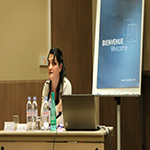Euroacademia Conferences
 Europe Inside-Out: Europe and Europeanness Exposed to Plural Observers (9th Edition) April 24 - 25, 2020
Europe Inside-Out: Europe and Europeanness Exposed to Plural Observers (9th Edition) April 24 - 25, 2020 Identities and Identifications: Politicized Uses of Collective Identities (9th Edition) June 12 - 13, 2020
Identities and Identifications: Politicized Uses of Collective Identities (9th Edition) June 12 - 13, 2020 8th Forum of Critical Studies: Asking Big Questions Again January 24 - 25, 2020
8th Forum of Critical Studies: Asking Big Questions Again January 24 - 25, 2020 Re-Inventing Eastern Europe (7th Edition) December 13 - 14, 2019
Re-Inventing Eastern Europe (7th Edition) December 13 - 14, 2019 The European Union and the Politicization of Europe (8th Edition) October 25 - 26, 2019
The European Union and the Politicization of Europe (8th Edition) October 25 - 26, 2019 Identities and Identifications: Politicized Uses of Collective Identities (8th Edition) June 28 - 29, 2019
Identities and Identifications: Politicized Uses of Collective Identities (8th Edition) June 28 - 29, 2019 The European Union and the Politicization of Europe (7th Edition) January 25 - 26, 2019
The European Union and the Politicization of Europe (7th Edition) January 25 - 26, 2019 7th Forum of Critical Studies: Asking Big Questions Again November 23 - 24, 2018
7th Forum of Critical Studies: Asking Big Questions Again November 23 - 24, 2018 Europe Inside-Out: Europe and Europeanness Exposed to Plural Observers (8th Edition) September 28 - 30, 2018
Europe Inside-Out: Europe and Europeanness Exposed to Plural Observers (8th Edition) September 28 - 30, 2018 Identities and Identifications: Politicized Uses of Collective Identities (7th Edition) June 14 - 15, 2018
Identities and Identifications: Politicized Uses of Collective Identities (7th Edition) June 14 - 15, 2018
Re-Negotiating European Identity in Times of Economic Crisis
-
-

-
Presentation speakers
- Beyza Ç. Tekin, Galatasaray University, Department of International Relations, Istanbul, Turkey
- Download presentation
Abstract:
This paper analyses the recent debates on the euro-area crisis, particularly the Greek bailout discussions, with the aim of shedding light into ongoing constructions of a collective European identity. Discourses and the politics of representation surrounding the Greek debt crisis show us the invalidity of characterization of the EU as a post-modern collectivity. What is observed is the return of clear, rigid constructions of the inside/outside and Self/Other, contrary to the premises of post-modern collectivity characterization of Europe. The dominant leadership role of Franco-German ‘couple’ in recent developments and the new institutional mechanisms through which the EU interacts with its member states show us that the EU is not a true ‘multiperspectival polity’ characterized by the lack of a single center of power.
In this respect, this paper shows how Greece is differentiated, or distanced to, if not excluded from, the collective Self, particularly by means of binary oppositions and discursive structures. The paper presents a set of binary oppositions that serve to break the homogeneity of the EU in-group, establishing power relations, a hierarchy between the core – the center, the ‘truly European’ – and the periphery – the ‘lesser Europeans’, ‘Other(s) within the Self’ – which include indebted, economically troubled, Southern European members of the Union.
-


















